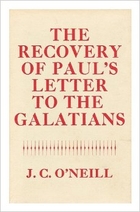 J. C. O’Neill (1930-2004) was a well respected critical scholar with some controversial views and always offering stimulating argument. Possibly the most controversial was his Who Did Jesus Think He Was? in which he argued that Jesus did believe he was the Messiah and that even the doctrine of the Trinity could be detected in the Gospels. He also wrote The Recovery of Paul’s Letter to the Galatians (1972). In that work he found himself forced to conclude that the passage declaring Jesus was “born of a woman” was not original to Paul. This should be quite a surprise to anyone who has encountered scholars scoffing at any doubts about the historical existence of Jesus because the passage in Galatians averring that Jesus was “born of a woman” is invariably declared to be iron-clad evidence that Paul had good reason to know that Jesus was, well, born of a woman. Presumably these scholars are convinced that no-one would ever suggest a fictive person would have come into the world by means of a birth or that the gender through whom he was born would be female.
J. C. O’Neill (1930-2004) was a well respected critical scholar with some controversial views and always offering stimulating argument. Possibly the most controversial was his Who Did Jesus Think He Was? in which he argued that Jesus did believe he was the Messiah and that even the doctrine of the Trinity could be detected in the Gospels. He also wrote The Recovery of Paul’s Letter to the Galatians (1972). In that work he found himself forced to conclude that the passage declaring Jesus was “born of a woman” was not original to Paul. This should be quite a surprise to anyone who has encountered scholars scoffing at any doubts about the historical existence of Jesus because the passage in Galatians averring that Jesus was “born of a woman” is invariably declared to be iron-clad evidence that Paul had good reason to know that Jesus was, well, born of a woman. Presumably these scholars are convinced that no-one would ever suggest a fictive person would have come into the world by means of a birth or that the gender through whom he was born would be female.
Authority of the epistle remains
But don’t let me misrepresent J.C. O’Neill. Though O’Neill believed Galatians was riddled with “interpolations” he nonetheless hoped that his analysis would
clear the way for a fresh conviction that Paul was in fact an apostle of the Son of God. (p. 13 — my bolding and formatting in all quotations)
If our final text of Galatians was not entirely Paul’s original writing then the authority of the whole letter was only minimally affected as far as the Church is concerned:
This book (“The Recovery of Paul’s Letter to the Galatians”) should make it easier to accord to Paul the authority due to him, and also make it easier to accord to the later theologians (i.e. those responsible for the interpolations and glosses in Galatians) the lesser authority due to them for their insights into the doctrinal consequences of the apostle’s teaching. (p. 13)
Cannot return to the older approach

O’Neill may have been true to what we might see as a conservative faith, but was also true to critical principles in the study of the Scriptures.
We cannot simply return to the older approach; we are bound to accept Spinoza and Locke for, whether we like it or not, we are heirs of the whole modern awareness of history. We must, at all costs, discover what Paul himself wrote, and we must discover, as precisely as we can, the history of the text of his epistles, from the time they were received by those he first addressed until the time when they were gathered together, in a more or less fixed form, into the Christian canon. (p. 12)
Spinoza? Locke?
| SPINOZA | LOCKE |
|---|---|
| “The universal rule . . . in interpreting Scripture is to accept nothing as an authoritative Scriptural statement which we do not perceive very clearly when we examine it in the light of its history.” | Paul must have been “a coherent, argumentative, pertinent Writer; and Care, I think, should be taken, in expounding of him, to show that he is so.” |
| The “history” of a scriptural statement comprises:
— nature of its original language |
The starting point for studying Paul is therefore to read the epistles through from beginning to end many times to see the coherence of the argument. |

Why think there are any interpolations at all?
Why can we not assume that the text we have was all Paul’s to begin with? J. C. O’Neill explains why: Continue reading ““Born of a Woman” — Sober Scholarship Questioning the Authenticity of Galatians 4:4″
